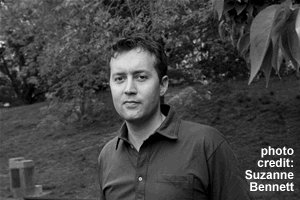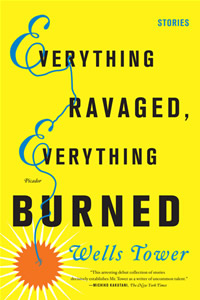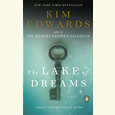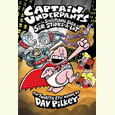Savage Lunacy, Comical Rage
Wells Tower talks with Chapter 16 about the tensions between fiction and journalism, his recent collaboration with painter John Currin, and his real opinion of chitlins
“I got an understanding of how terrible love can be,” writes Wells Tower in the title story of his debut collection, Everything Ravaged, Everything Burned. “You wish you hated those people, your wife and children, because you know the things the world will do to them, because you have done some of those things yourself.” The unsettling, searing truth of this insight dazzles all the more for having been made by a Norse Viking settling down after a journey of sacking and pillaging that is part Monty Python sketch, part Led Zeppelin’s Immigrant Song, and a succinct window into the tragicomic lunacy that has led to Wells Tower’s emergence as one of America’s most daring and promising young writers.
Though his ascension may have seemed sudden to the general reading public, for over a decade Tower’s reputation had been building among literary aficionados for his stories in national magazines like The New Yorker and Harper’s and in literary journals like Fence and McSweeney’s. Simultaneously, Wells Tower has cultivated a body of similarly clever, off-beat feature magazine journalism, tackling odd adventures in Gonzo, New Journalistic style. For Outside, he paddled Florida’s Wekiva River in a tire tube. For Harper’s, he attempted to infiltrate the George W. Bush re-election campaign. For The Washington Post Magazine, he took a job working at a carnival (an experience that also yielded the short story “On the Show” from Everything Ravaged).
As his star continues to rise, Tower has persisted in developing a style notable for its quirky insights, its arch, hip humor, and its stylistic and formal fearlessness. His most recent published work, a collection of short-short stories titled Post-Darwinian Experiments in Consciousness, appears in a collection of paintings by John Currin, one of America’s most highly regarded and controversial artists, whose most recent work takes his reverence for the old masters of figurative oil painting to new extremes, using the grand scope and technical mastery of Renoir, Botticelli, and Velazquez to render explicit erotic images. Like Currin’s paintings, Tower’s themes are often elusive—even perplexing—but never unremarkable.
 In advance of his visit to Vanderbilt, Wells Tower answered questions for Chapter 16.
In advance of his visit to Vanderbilt, Wells Tower answered questions for Chapter 16.
Chapter 16: Everything Ravaged, Everything Burned is your first book, but you’ve been publishing stories and magazine features for years. How do you balance the considerably different demands of the more consciously commercial world of magazine writing against the art of writing fiction?
Tower: You learn to dissociate the two. When I was first starting out, I had the misguided idea that I could write short stories using the reliable methods I’d acquired doing magazine work: you go out reporting, harvest a great quantity of material, shape it into scenes, formulate a contextual argument for the piece’s existence, and bango, paycheck. For a time, I was trying to write short fiction the same way, to do vast, vague brainstorms for seventy or eighty pages and then try to cook them down into a story. I pretty quickly learned that fiction needs to be born from a more focused unity of intention, a hot, dense spot in your head pulling language and incident into itself.
Chapter 16: How did you get involved in the book with John Currin?
Tower: I met John through a mutual friend, and he asked if I might do some writing for his catalogue. I was honored to contribute.
Chapter 16: Much of John Currin’s recent work seems to be intent on challenging perceptions of the line between erotic art and pornographic obscenity. The cover image of the new collection certainly seems designed to provoke conservative sensibilities. Did you have any reservations about sharing space with such explicit images?
Tower: Nope.
Chapter 16: Post-Darwinian Experiments in Consciousness and Other Stories echoes the surreal quality of Currin’s paintings in an almost severely economical form, at least when compared to the more expansive work in Everything Ravaged. Is this a new direction for you?
 Tower: The stylistic curtness of those stories stems from what I perceived to be the constraints of the form, the short-short, which I’d never messed around with before. Telling a story in a couple of hundred words doesn’t leave much room for the showier descriptive stuff with which EREB is thoroughly salted. The novel I’m working on isn’t nearly so aggressively compressed, stylewise. But writing the Currin stories was a pleasure. I hope to do more shorties down the line.
Tower: The stylistic curtness of those stories stems from what I perceived to be the constraints of the form, the short-short, which I’d never messed around with before. Telling a story in a couple of hundred words doesn’t leave much room for the showier descriptive stuff with which EREB is thoroughly salted. The novel I’m working on isn’t nearly so aggressively compressed, stylewise. But writing the Currin stories was a pleasure. I hope to do more shorties down the line.
Chapter 16: You wrote a terrific piece for Garden & Gun on the late Barry Hannah, and it strikes me that Everything Ravaged seems to echo Hannah in the savage lunacy of your imagery and the muted, heartbroken but frequently comical rage of so many of your characters. There are also, of course, echoes of O’Connor, along with a dash of arch, post-modern quirkiness, especially in the title story, with its oddly domestic crew of roving, pillaging Vikings. Do you see these writers as overt influences on your work? Are there other writers who have had a more direct influence?
Tower: So glad you enjoyed the piece on Hannah. It was a thrill for me to get to spend a weekend with him. And sure, Barry’s an influence, or at least the embodiment of a commandment to imbue every sentence with its own weird life. Also, of course, O’Connor, whose stuff leaves us all striving toward the unreachable bar she set for narrative design and the superbly architected emotional traps she lays for her characters. So, sure, they’re biggies. But then, so is nearly every book I read and admire. Lately, The-Palm-of-the-Hand stories by Yasunari Kawabata, Pulphead by John Jeremiah Sullivan, and The Dubious Salvation of Jack V. by the brilliant young writer Jacques Strauss have especially blown me away.
Chapter 16: You were born in Canada but raised in North Carolina, and you now divide your time between Chapel Hill and Brooklyn. There’s certainly a strong sense of the South in the lyricism of your style and your wicked sense of humor. Quite a few of your stories are set in distinctly Southern locales, but just as many are in settings as disparate as California and Medieval Scandinavia. Do you consider yourself a “Southern” writer? Are those kinds of regional distinctions still meaningful?
Tower: Diminished, but still meaningful, I think. The South still feels to me like America’s most distinct exurban region, probably for the specious reason that I grew up here, and that the South touts its own distinctiveness more shamelessly than, say, the Midwest. There’s much to love about the South that I love, not least its writers, and an endemic glee in language-play detectable in everyone from Shelby Foote to the guy who cleans your septic tank. But, no, I can’t really consider myself a Southern writer. My parents are Yankees. In Chapel Hill, where I live, you’ve got to canvass fairly widely to turn up a serious accent. I wouldn’t eat a chitterling at gunpoint.
Wells Tower will appear in Buttrick Hall, Room 101, on the Vanderbilt University campus in Nashville, January 12, 2012, at 7 p.m.





